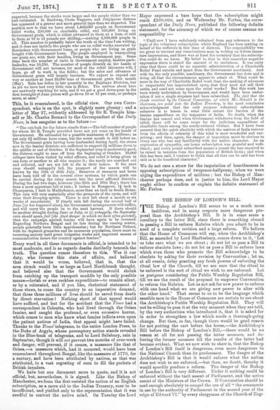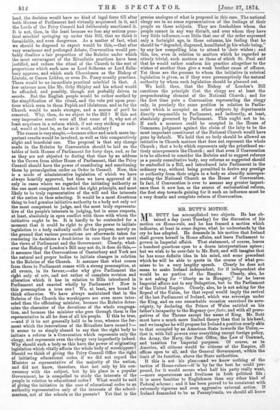THE BISHOP OF LONDON'S BILL.
THE Bishop of London's Bill seems to us a much more insidious, and in many respects more dangerous pro- posal than the Archbishop's Bill. It is in some sense a corollary to the latter Bill, since there is something absurd in passing a Bill to enforce Rubrics which you admit to be in need of a complete revision and a large reform. We believe that the House of Commons will say, when the Archbishop's Bill, as amended by Lord Shaftesbury, comes down to it, Let us take care what we are about ; do not let us pass a Bill to enforce obsolete laws ; do not let us pass a Bill to enforce laws which even those who promote the Bill acknowledge to be obsolete by asking for their revision by Convocation ; let us, at all events, delay granting any fresh powers of enforcing the ritual law of the Church, till we are sure that the ritual to be enforced is the sort of ritual we wish to see enforced. Lot us postpone considering the Public Worship Regulation Bill, till we see the result of the proposal to empower Convocation to reform the Rubrics. Let us not ask for new power to enforce with one hand what we are giving new power to alter with the other hand.' That seems to us to be the language which sensible men in the House of Commons are certain to use about the Archbishop's Public Worship Regulation Bill. They will not be willing to pass it at the very moment when they are told, by the very authorities who introduced it, that it is asked for in order to strengthen a law which needs a thorough-going change. But then, so far, though there would be good reason for not putting the cart before the horse,—the Archbishop's Bill before the Bishop of London's Bill,—there would be no reason at all for not passing the latter measure, and de- ferring the former- measure till the results of the latter had become evident. What we now wish to show is, that the Bishop of London's Bill itself is dangerous, even more dangerous to the National Church than its predecessor. The danger of the Archbishop's Bill is that it would enforce what the nation does not wish to see enforced,—but then, no doubt, thereby it would speedily produce a reform. The danger of the Bishop of London's Bill is very different. Under it nothing could be enforced without the tacit assent of Parliament, and the active assent of the Ministers of the Crown. If Convocation should be mad enough absolutely to compel the use of all " the ornaments in use by the authority of Parliament in the second year of the reign of Edward VI." by every clergyman of the Church of Eng-
land, the decision would have no kind of legal force till after both Houses of Parliament had virtually acquiesced in it, and the Lords of the Privy Council had deliberately sanctioned it.
It is not, then, in the least because we fear any serious prac- tical mischief springing up under this Bill, that we think it formidable, and even dangerous. As a matter of fact, what we should be disposed to expect would be this,—that after very wearisome and prolonged debate, Convocation would pro- bably disallow a fair proportion of the Rubrics under which the most extravagant of the Ritualistic practices have been justified, and reduce the ritual of the Church to the sort of proportions which such men as Lord Selborne or Lord Salis- bury approve, and which such Churchmen as the Bishop of Lincoln, or Canon Liddon, or even Dr. Pusey usually practises.
There would be no immediate practical mischief in that. A few extreme men like Mr. Orby Shipley and his school would be offended, and possibly, though not probably driven to secede. But the English people would be rather soothed by the simplification of the ritual, and the veto put upon prac- tices which seem to them Popish and idolatrous, and so far the Church would be made stronger, and a source of peril be removed. Why, then, do we object to the Bill ? If this not very impressive result were all that came of it, why not at least acquiesce in a reform which, if not very striking or radi- cal, would at least be, so far as it went, salutary ?
The reason is very simple,—because other and much more im- portant results would be involved, as well as this comparatively slight and beneficial one. The proposal is that any change made in the Rubrics by Convocation should be laid on the tables of both Houses of Parliament for forty days, and, so far
as they are not objected to during that time by an address to the Crown from either House of Parliament, that the Privy Council should have the power of considering and sanctioning them by promulgation under an Order in Council. Now, this is a mode of administrative legislation of which we have always heartily approved, but then we have approved of it only in cases where we regarded the initiating authority as the one most competent to select the right principle, and most likely to be truly representative of the will and the interests of the nation in thus selecting. It would be a most disastrous thing to lend genuine initiative authority to a body not only not the most competent to judge, and the most truly representa- tive of the people's interests in judging, but in some respects, at least, absolutely in open conflict with those with whom the initiative ought to be. It is hardly to be contended for a moment that it could be right to give the power to initiate legislation to a body radically unfit for the purpose, merely on the ground that various precautions are afterwards taken for rendering its decisions a dead-letter in case they do not meet the views of Parliament and the Government. Clearly, what- ever the Bishop of London's Bill may not do, it does do this,— it assumes that the Convocations of Canterbury and York are the natural and proper bodies to initiate changes in relation to the Rubrics of the Church. It assumes that what comes from them to Parliament comes with a strong presumption, at all events, in its favour,—else why give Parliament the right only of veto, and not rather of complete revision and alteration which it has in relation to Bills introduced in Parliament and enacted wholly by Parliament ? Now is this presumption a true one I We, at least, are bound to think otherwise. We have always maintained that in the Rubric's of the Church the worshippers are even more inter- ested than the officiating minister, because the Rubrics deter- mine the character of the devotions of the whole congrega- tion, and because the minister who goes through them is the representative in all he does of all his people. If this be true, —and if it be not generally held to be true, whence the fer- ment which the innovations of the Ritualists have caused ?- it seems to us simply absurd to say that the right body to initiate a reform is a Convocation which represents only the clergy, and represents even the clergy very imperfectly indeed. Why should such a body as this have, the power of originating legislation which vitally affects the whole body of worshippers ? Should we think of giving the Privy Council Office the right of initiating educational codes, if we did not regard the Minister as representative of the majority of the nation, and did not know, therefore, that not only by his con- versancy with the subject, but by his place in a popular Government, he is compelled to study the interests of the people in relation to educational codes ? What would be said of giving the initiative in the case of educational codes to an authority representative only of the interests of the school- masters, not of the schools or the parents? Yet that is the precise analogue of what is proposed in this case. The national clergy are in no sense representatives of the feelings of their people on these subjects. They are freeholders whom the people cannot in any way disturb, and over whom they have very little influence,—so little that one of the order expressed only a fortnight ago, in these columns, his feeling that he should be "degraded, disgraced, humiliated in his whole being," by any law compelling him to attend to Lheir wishes ; and this, too, even in relation to matters which he regarded as utterly trivial, such matters as those of which St. Paul said that he would rather conform his practice altogether to the wishes of another than give a weak brother cause of offence. Yet these are the persons to whom the initiative in rubrical legislation is given, as if they were presumptively the natural authority by whom such legislation should be planned out.
We hold, then, that the Bishop of London's Bill sanctions the principle that the clergy are at least the preponderating element of the National Church ; and for the first time puts a Convocation representing the clergy only, in precisely the same position in relation to Parlia- ment which is occupied on other subjects by departments directly responsible to Parliament, and indirectly, at least, absolutely governed by Parliament. This ought not to be. If such a measure could be accepted in the House of Commons, judgment against the claim of the laity to be the most important constituent of the National Church would have gone by default. We hold that no body should be allowed an initiative in Church matters that does not represent the whole Church ; that a body which represents only the priesthood en- tirely misrepresents the Church ; and that even if Convocation is to be allowed to consider the Rubrics and to suggest reforms as a purely consultative body, any reforms so suggested should be embodied in a Bill, and introduced into Parliament in the ordinary way, without being permitted to derive any prestige or authority from their origin in a body so absurdly misrepre- senting the National Church as the House of Convocation. In fact, if Convocation is ever to assume any greater import- ance than it now has, as the source of ecclesiastical reform, the first step towards gaining for it such an influence must be a very drastic and complete reform of Convocation.



































 Previous page
Previous page